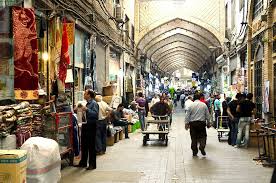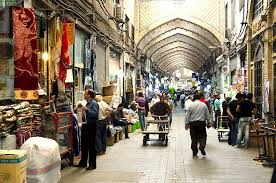
Consumers in Iran are reportedly holding off on purchases of domestic goods and waiting for foreign brands and products to arrive as the country reached a nuclear deal that will open its markets to the world.
However officials fear that an economic stagnation like situation might occur due to this tendency of consumers.
Shoppers are excited at the prospect of more choice and competition that should force Iranian manufacturers to lower prices and improve quality in terms of consumer products ranging from cars to fridges and televisions.
It is expected that following the deal between Iran and the world powers, banking and other sections would see lifting of sanctions as early as 2016. The deal would make it easier for foreigners to partner with Iranian firms or export to Iran.
Data from the central bank of Iran shows that since the deal, there has been a fall in growth of Iranian manufacturers in sales prices far behind inflation. Slowdown in consumer spending and warehouses filling with unsold goods has been identified as the reason for this growth fall.
"The subsequent rush of Western businesses to enter the Iranian market informed Iranian consumers that soon there will be alternative supplies of consumer goods priced more competitively and with a substantially higher quality and post-sale services," said Mehrdad Emadi, an economist at the Betamatrix consultancy in London.
While the consumer anticipation of lower prices and foreign goods is a challenge to manufacturers used to a captive market, it is expected that the ensuing competition following the entry of foreign brands into the Iranian market is likely to lift Iran's economy in the long term.
"Unfortunately some people thought prices would fall suddenly after the nuclear deal, and because of this the market is facing a recession," Vice President Eshaq Jahangiri was quoted as saying by state news agency IRNA this month.
Growth could fall to zero, compared to 3 percent last year, according to the ISNA agency, said Mehdi Pourghazi, head of the industrial committee of the Tehran Chamber of Commerce.
The brunt of the heat is being faced by the car industry which is the biggest non-oil sector of the Iranian economy. There was a drop in new car registrations for the first five months of the Iranian year by 15 percent compared ot the same period a year ago, said traffic police chief Taghi Mehri to the ISNA agency this month.
The social media is abuzz with Iranians urging a boycott of local carmakers highlighting frustration at the lack of choice.
"I sold my car two weeks ago and wanted to buy a new one, but I decided to wait until the price is lower. Iranian car makers should learn they cannot rule the market by monopoly," one supporter Mehdi posted on Facebook.
The manufacturing Producer Price Index (PPI) of Iran fared drastically in the Iranian month to August 22 compared on a year-on-year basis with the index just noting a 1% increase compared to 11.2 percent in the previous year during the same period. The growth was far below the inflation rates of between 14 and 17 percent.
"If we believe in the free-market economy we should accept that the customer is always right People supported this campaign because there is a void in the market" Mohammad Reza Sabzalipour, President of Tehran's World Trade Centre, told Reuters.
"If foreign companies or countries think they can take control of a market of 80 million people, they are mistaken, and we must not allow it," he said.
(Source:voiceofamerica)
However officials fear that an economic stagnation like situation might occur due to this tendency of consumers.
Shoppers are excited at the prospect of more choice and competition that should force Iranian manufacturers to lower prices and improve quality in terms of consumer products ranging from cars to fridges and televisions.
It is expected that following the deal between Iran and the world powers, banking and other sections would see lifting of sanctions as early as 2016. The deal would make it easier for foreigners to partner with Iranian firms or export to Iran.
Data from the central bank of Iran shows that since the deal, there has been a fall in growth of Iranian manufacturers in sales prices far behind inflation. Slowdown in consumer spending and warehouses filling with unsold goods has been identified as the reason for this growth fall.
"The subsequent rush of Western businesses to enter the Iranian market informed Iranian consumers that soon there will be alternative supplies of consumer goods priced more competitively and with a substantially higher quality and post-sale services," said Mehrdad Emadi, an economist at the Betamatrix consultancy in London.
While the consumer anticipation of lower prices and foreign goods is a challenge to manufacturers used to a captive market, it is expected that the ensuing competition following the entry of foreign brands into the Iranian market is likely to lift Iran's economy in the long term.
"Unfortunately some people thought prices would fall suddenly after the nuclear deal, and because of this the market is facing a recession," Vice President Eshaq Jahangiri was quoted as saying by state news agency IRNA this month.
Growth could fall to zero, compared to 3 percent last year, according to the ISNA agency, said Mehdi Pourghazi, head of the industrial committee of the Tehran Chamber of Commerce.
The brunt of the heat is being faced by the car industry which is the biggest non-oil sector of the Iranian economy. There was a drop in new car registrations for the first five months of the Iranian year by 15 percent compared ot the same period a year ago, said traffic police chief Taghi Mehri to the ISNA agency this month.
The social media is abuzz with Iranians urging a boycott of local carmakers highlighting frustration at the lack of choice.
"I sold my car two weeks ago and wanted to buy a new one, but I decided to wait until the price is lower. Iranian car makers should learn they cannot rule the market by monopoly," one supporter Mehdi posted on Facebook.
The manufacturing Producer Price Index (PPI) of Iran fared drastically in the Iranian month to August 22 compared on a year-on-year basis with the index just noting a 1% increase compared to 11.2 percent in the previous year during the same period. The growth was far below the inflation rates of between 14 and 17 percent.
"If we believe in the free-market economy we should accept that the customer is always right People supported this campaign because there is a void in the market" Mohammad Reza Sabzalipour, President of Tehran's World Trade Centre, told Reuters.
"If foreign companies or countries think they can take control of a market of 80 million people, they are mistaken, and we must not allow it," he said.
(Source:voiceofamerica)





